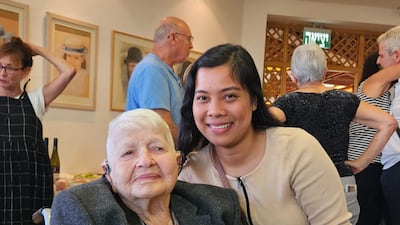A Filipina caregiver’s nerves of steel saved her life and that of her elderly Israeli employer when Hamas militants attacked their community near the border with the Gaza Strip on October 7.
Carmilla Figueras Jesalva hid with Nitza Hefetz, 94, in the safe room of their house after the alarm in Kibbutz Nirim sounded at 6.30am that day.
They heard gunshots nearby, and then the sound of men ransacking the house.
Ms Jesalva, 31, had to keep the door jammed shut as it had no lock, while also keeping Ms Hefetz calm as the hours passed.
But at around noon, the door was pushed open and a Hamas gunman walked in.
Filipino caregiver tells Hamas gunman to spare life of Israeli employer
“I stood up – Nitza was sleeping – and I said, ‘Shalom, sir,’” Ms Jesalva told The National.
“He asked for money and Nitza woke up and asked him to get out. She was angry and did not understand why he had entered.
“I turned my face to her so she could see I'm scared. I told her, ‘Please be quiet.’”
Take everything but don't hurt us
Ms Jesalva said she pleaded with the gunman to spare their lives, then offered him her purse with the 1,500 shekels ($370) she had saved up for her trip home to Manila that she was supposed to begin just two days later.
“I said, ‘Take everything, all I have, but don’t hurt us.' I put all my money in his hand.”
She asked only that he leave behind her passport.
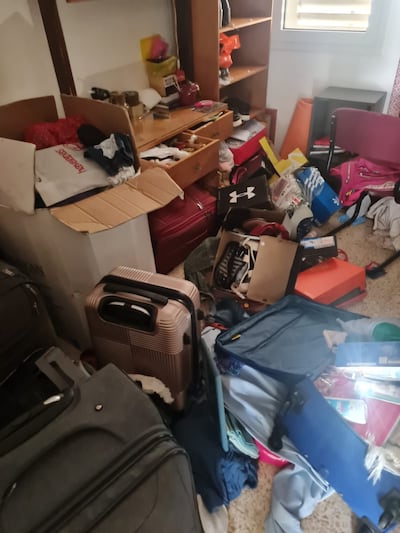
She said the gunman then threw bags on the floor, demanding to know the contents, leaving only after he was convinced there was nothing of value.
“He could not move because the shelter was so narrow. Then he stepped out, so I closed the door, hoping he would go in peace,” Ms Jesalva said.
Once he was gone, she held on to Ms Hefetz for hours, overcome by the shock of her experience.
“Without her I would have broken down,” Ms Jesalva said. “I was shaking so much; we took care of each other.”
Miracle to survive
They remained in hiding until Israeli soldiers reached them at about 3.30pm, but the hours until then were nerve-racking.
From the safe room, Ms Jesalva messaged her mother in the Philippines to ask her to send a photograph of her six-year-old son.
“I said to my mum, ‘I think I cannot survive. I want the last figure I see to be my son. I don’t want to die, mum.’”
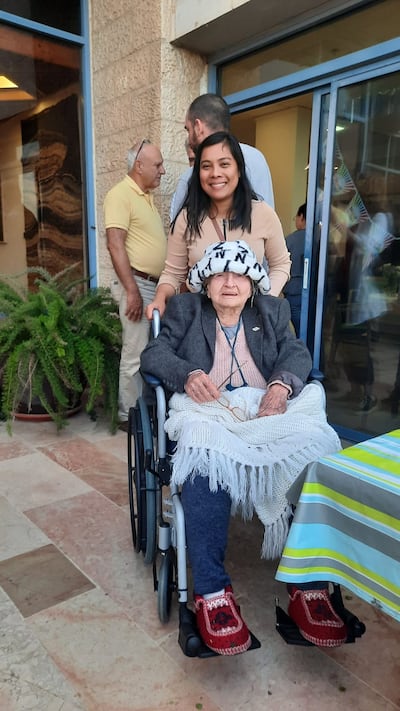
It was also a challenge to keep Ms Hefetz from making a sound, as she did quite not understand what was happening.
“My Nitza was awake and asleep, when she spoke, I covered her mouth,” Ms Jesalva said.
It was only when they left the house that she grasped the extent of the Hamas assault.
“Our neighbourhood was on fire, my friends were dead. I saw bullets all around,” she said.
More than 1,400 people were killed and more than 200 taken hostage in the Hamas attacks. At least four Filipino workers were killed and two taken hostage, according to the Philippines Foreign Ministry.
Ms Jesalva, who worked as a waitress in Dubai for two years before she moved to Israel in 2018, is now living with Ms Hefetz at the Nofim Tower care home in Jerusalem while also receiving trauma support.
In social media posts, Ms Hefetz's family has described her as an “angel” and has been praised by a remittance company that gave her an award as a “true hero who entered the hearts of all”.
In a Facebook post with photos of Ms Hefetz's 95th birthday on October 21, the care home said that it “wouldn’t have been celebrated if it were not for the help of Nitza’s loyal caretaker”.
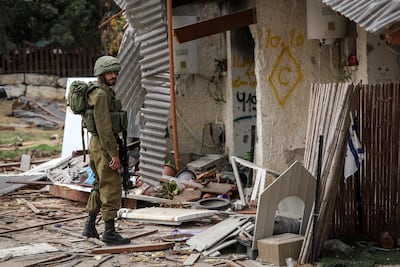
Ms Jesalva said she struggles with panic attacks and psychological scars that will take time to heal.
“I have too much trauma,” she said.
“I get scared of big windows – maybe someone will shoot me; I talk to myself and ask, ‘Am I alive?' I don’t like narrow spaces.
“But I keep praying for peace between Israel and Palestine.”
Caught in the crossfire
There are dozens of stories of courage shown by Philippine caregivers to protect their elderly charges from Hamas.
Irene Torres, 25, was hurrying her 90-year-old patients to the safe room when gunmen burst into their house in Kibbutz Kissufim and started firing.
“We got to the safe room just in time,” she said.
She left briefly for bread and water the following morning, but they were only rescued after 35 hours, Ms Torres said.
“It is so traumatising. At night I cannot sleep, I remember gunfire.
“Even a small noise and my body shakes.”
After 10 days of trauma counselling, she returned to work caring for the couple.
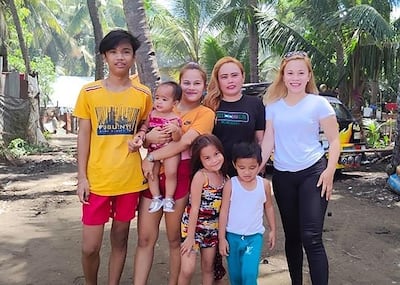
'Who will take care of old people?'
The Philippines government has offered to get its citizens to safety, but most have decided to remain in Israel.
Lourdes Levi, 64, a registered nurse who has lived in Israel for more than 20 years, also works with Philippine officials to liaise between workers and their relatives at home.
“Foreign workers are very afraid. They saw people burnt and killed, they have depression and trauma,” she said.
“No one thought they [Hamas] would kill foreign workers.
“I admire my people – they had a chance to leave when the massacre started but they did not run.
“Who will take care of old people if we are not there? They are like our family. It is our job – from our heart and mind.”
